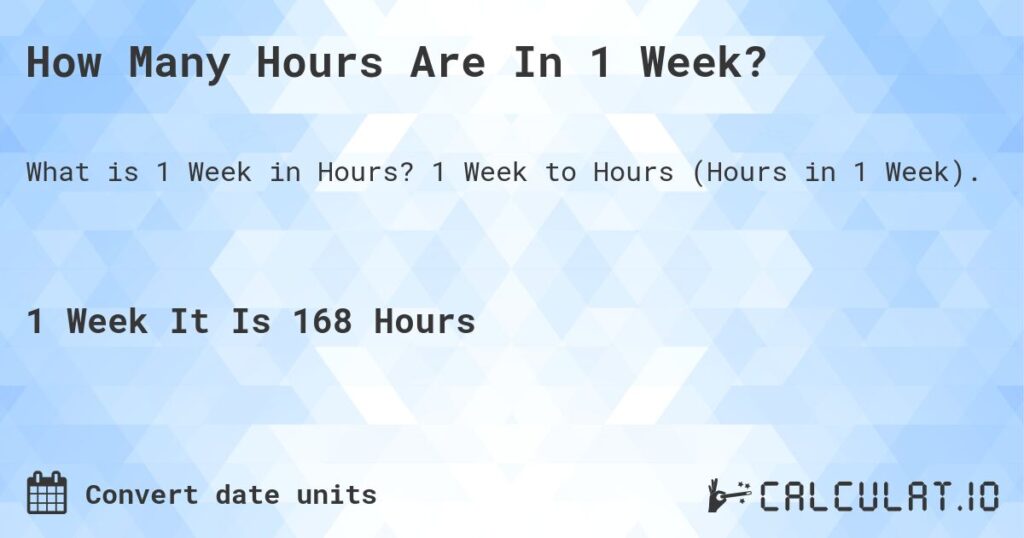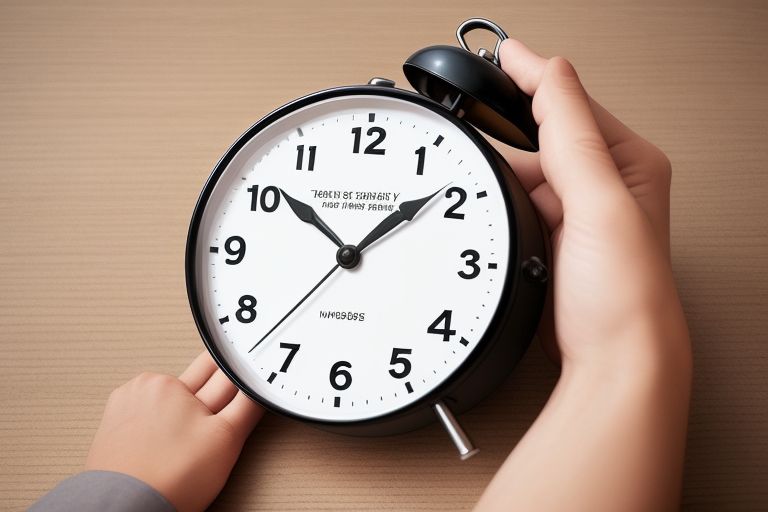How many hours are in a week? This is a common question when people try to manage their time better. A week has exactly 168 hours, which means you have 168 chances to use your time wisely. Whether you are working, sleeping, or having fun, time keeps moving, and every hour counts.
Understanding how many hours are in a week can help you plan your daily activities. If you work a full-time job, spend time with family, or enjoy hobbies, knowing your weekly hours can make your life more balanced. Let’s break down the 168 hours and see how they fit into different parts of your daily routine.
Table of Contents
How Many Hours Are in a Week? The Simple Answer
A week has exactly 168 hours. This is a fixed number that never changes. Whether it is a busy week or a slow one, there are always 168 hours from Monday to Sunday.
These hours include everything we do—working, sleeping, eating, and having fun. Understanding this can help us plan our days better. Since time cannot be increased or saved, using it wisely is important.

Breaking Down 168 Hours: Where Does Your Time Go?
Each day has 24 hours, and a week has 7 days. When you multiply 24 by 7, you get 168 hours. But how do we use these hours?
Most people spend around 50 to 60 hours working, including overtime. Sleeping takes up another 50 hours if we get 7 hours per night. The remaining time is used for eating, traveling, and relaxing.
How Many Hours Do We Spend Sleeping Every Week?
Sleep is very important for health. Doctors say adults need 7 to 9 hours of sleep each night. If you sleep 8 hours a night, you will sleep 56 hours in a week.
Some people sleep less because of work, stress, or bad habits. Not sleeping enough can make you feel tired, slow, and unhappy. A good sleep schedule helps improve focus and energy.
Work, Rest, and Fun: How to Divide Your 168 Hours
It is important to balance work, rest, and fun. Here’s how an average person might spend their week:
- Work: 40 to 50 hours
- Sleep: 50 to 60 hours
- Eating and cooking: 10 to 15 hours
- Traveling: 5 to 10 hours
- Entertainment and hobbies: 20 to 30 hours
Balancing these activities helps in living a happy and healthy life.
How Many Hours Are in a Week Compared to a Month?
A month has about 4.3 weeks on average. Since a week has 168 hours, a month has around 720 hours.
While a week is easy to manage, a month is harder to plan. Keeping track of weekly hours can help in managing long-term goals.
Time Management: How to Use 168 Hours Wisely
Using time wisely helps in getting more done. Here are some tips:
- Make a schedule to plan your day.
- Set priorities and do important tasks first.
- Take breaks to avoid getting too tired.
- Sleep well to stay focused and energetic.
Good time management makes life easier and more enjoyable.
The Science of Time: Why 168 Hours Matters
Time moves at the same speed for everyone. Scientists say people feel time differently based on their activities.
When we do something fun, time seems to move fast. When we are bored, time feels slow. Knowing this helps us plan better and enjoy life more.
How Many Hours Do Successful People Work in a Week?
Many successful people work long hours. Some work 50 to 60 hours per week, while others work 80 hours or more.
However, working too much can cause stress and burnout. A balance between work and rest is important for long-term success.
Weekend vs. Weekdays: How Time Feels Different
Weekends feel shorter because they are fun and relaxing. Weekdays often feel longer due to work and responsibilities.
Spending weekends wisely by resting, learning, and having fun can make them more enjoyable.
Can You Save Time? Understanding the 168-Hour Rule
Time cannot be saved like money, but it can be used better. The 168-hour rule helps in planning time well.
By tracking activities, people can find ways to be more productive and enjoy life more.
Are 168 Hours Enough? The Secret to Productivity
Some people feel 168 hours are too little, while others think it is enough. The secret is to stay organized and focused.
Making small changes in daily habits can free up extra hours for important activities.
The Power of Planning: Make the Most of Your 168 Hours
How to Plan Your Week Effectively:
- Write a to-do list every day.
- Avoid wasting time on unimportant tasks.
- Set time limits for each activity.
- Take care of health with proper sleep and breaks.
Planning well leads to more free time and less stress.

Conclusion
A week has 168 hours, and how we use them decides our success and happiness. Good time management helps balance work, rest, and fun.
Tracking time and making small changes can improve life. Using time wisely helps in staying happy, healthy, and productive.
FAQs
Q: How many hours are in a week exactly?
A: There are 168 hours in a week, which is 7 days of 24 hours each.
Q: How many hours do people work in a week?
A: Most full-time workers spend 40 to 50 hours working each week, including overtime.
Q: How many hours should I sleep in a week?
A: Experts recommend 49 to 63 hours of sleep per week for good health.

